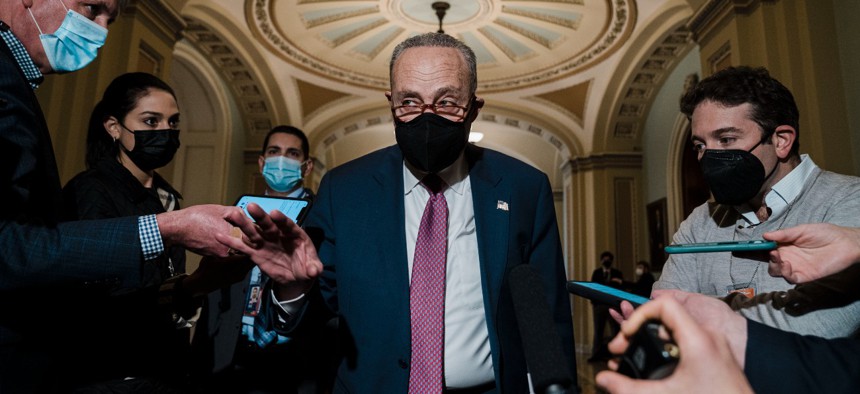The Senate Sidesteps Obstacles to Pass a 3-Week Shutdown-Averting Stopgap Spending Measure

Senate Majority Leader Chuck Schumer, D-N.Y., stops outside the Senate chamber to talk to reporters on Thursday. Kent Nishimura / Los Angeles Times via Getty Images
Lawmakers hope to pass full-year appropriations by March 11.
The Senate on Thursday cleared 65-27 a three-week stopgap bill to avoid a government shutdown, sending the measure to President Biden with just one day before the deadline.
The chamber narrowly avoided a series of landmines surrounding the vote, with Republicans demanding votes on various ancillary amendments related to COVID-19 vaccine mandates, the budget process and Health and Human Services Department grant programs. Ultimately, a sufficient number of Republicans joined all present Democrats to pass the measure to extend funding for agencies at their current levels through March 11. The House easily passed the bill last week, and Biden is expected to sign it into law by Friday evening.
Senate leadership agreed to vote on three amendments, though lawmakers had to walk a fine line to ensure none of the amendments passed. The House had already recessed and any changes to the continuing resolution would have forced a shutdown.
A handful of Republican senators pushed for a guarantee that no federal funds go toward enforcing COVID-19 vaccine mandates, even though all of the Biden administration's requirements not aimed at health care workers or military members are currently paused or rescinded after legal challenges. The lawmakers threw a similar wrench before the Senate passed the previous CR, and the vote on the anti-mandate amendment failed. The vote proved trickier this time around, as three Democrats were absent from Washington on Thursday. The amendment, as well as another measure from Sen. Ted Cruz, R-Texas, to ban schools and child care centers that receive federal funding from mandating vaccines, narrowly failed after four Republicans did not vote.
Sen. Mike Braun, R-Ind., pushed for another amendment to require Congress to balance its budget. That provision, which unlike the other amendments required 60 votes to pass, was easily defeated.
Some Republican senators also pushed a vote over previous reports that HHS was providing grant funding through its harm reduction program to organizations that offered individuals pipes for smoking crack. The Biden administration has repeatedly called the reports false and HHS Secretary Xavier Becerra said none of the grant funds would be used for pipes. Still, Sen. Marco Rubio, R-Fla., demanded a vote on an amendment to ensure no federal dollars go toward such a program. The Senate ultimately did not take up that vote after Rubio’s unanimous consent request was rejected.
It remained unclear much of Thursday how the Senate would resolve its voting obstacles. Throughout the process, Senate Majority Leader Chuck Schumer, D-N.Y., and Minority Leader Mitch McConnell, R-Ky., both maintained confidence that no one wanted a shutdown and a funding lapse would be averted.
The measure is the third continuing resolution of fiscal 2022, after Biden signed stopgaps into law in September and December. While Republicans briefly floated pushing a year-long CR, negotiators are now signaling a year-long omnibus appropriations bill is within reach. Top lawmakers said last week they reached a breakthrough agreement on a spending framework, which includes top-line funding levels that have not yet been made public. Appropriators must still iron out the exact spending for every federal program and office as part of the 12 individual bills that will make up the omnibus.






